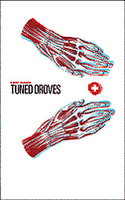
| Jacket 39 — Early 2010 | Jacket 39 Contents page | Jacket Homepage | Search Jacket |
This piece is about 3 printed pages long.
It is copyright © rob mclennan and Jacket magazine 2010. See our [»»] Copyright notice.
The Internet address of this page is http://jacketmagazine.com/39/r-baus-rb-mclennan.shtml
Eric Baus
Tuned Droves
reviewed by
rob mclennan
Octopus Books

1
This is an Accurate Picture of Space
A boy dressing himself in splashes.
The sand is smoke in the scene he comes in from. He erases the air around his mouth.
One name for a child is The Single Drop of Water. Another, The Sand a Single Drop Deflects.
His sound depends on a record skipping. The short song the sun repeats to itself.
A boy becomes related to water. A body recording over waves.
2
In his second poetry collection, Tuned Droves (Brooklyn NY/Portland OR: Octopus Books, 2009), Eric Baus works the extended lyric, “the elongated lyric,” as Andrew Joron writes on the back, writing eight extended lyrics that exist each as an extension of the other. This is finally a follow-up to his first collection, The To Sound (Verse Press, 2004), selected as that years’ winner of the Verse Prize by Forrest Gander. Even before reading his work, we already know that Baus isn’t in any kind of hurry. There is the loveliest ease in Baus’ poems, and he seems to be part of a series of young American poets working through this extended lyric, elongated lyric, alongside such as Joshua Marie Wilkinson, Rachel Zucker, Dorothea Lasky and Noah Eli Gordon (the last two included at the beginning as dedication in Baus’ new collection). There is the umbrella that envelopes his poems, his series and sequences of direct statements that somehow collage into something unreal, and unbearably concrete through tangents; a collage of lines that slowly and even deceptively connect. This is about slowness. These are poems built out of small stories, half or quarter told.
3
The Wires Led To a Hive
This is where I live but these are not my clothes. That is not my voice, a woman says.
She appears as herself. The same someone else.
Think of something quieter. Child-flower, bed-flower, the long pause her name created.
If a singer neglects her title long enough to lose her tone, the first of many eyes emerge.
This is the sign of a perfect listener. The look another not answering has.
4
Baus appears to be writing, in the end, a single poem that wraps itself up in everything else that came before, much in the same way as others, including bpNichol, Jack Spicer, Fanny Howe, Phil Hall, Robert Kroetsch and Robin Blaser. Baus reminds me of editor Michael Ondaatje quoting Spicer’s Admonitions for the introduction to his Long Poem Anthology (1979), reminding us that “Poems should echo and re-echo against each other. They should create resonances. They cannot live alone any more than we can … ” And so again, this is about slowness. Slowness, and how the world can’t help but connect.
5
Wake up, little what, wake up and be still.
Miss said I should not speak because a bee is clearing its wings. This made an image, for a time. And if I did, I would wake up without a throat.
Ding put both bees back and my ears got clear. I woke up a little. Miss put a page in my throat because it was not yet a story.
Wake up a little more, Ding. Be still, and hear a bee breathing.
6
In his infamous essay on the Canadian long poem, “For Play and Entrance: The Contemporary Canadian Long Poem” (The Lovely Treachery of Words, Oxford University Press, 1989), Kroetsch talked about the form as being tantric, writing about the perpetual delay, holding off the ending as far as possible, and Baus seems to have channeled part of this delay, extending and extending as far as the poem can go, working a direct kind of simple, yet complex abstract, as in the poem “Something Else the Music Was,” that begins its sequence of fragments with:
7
A woman leaves a bus and a man feels as if he has just stepped off of a train.
Rain is when you get wet is what he thinks next.
She thinks of orange when he is being quiet. Feeling red when she sees the sun.
Here her singing is speaking too. The sun is hot, I’m singing too.
The sun is orange, he says to himself.
8
Eric Baus might not be in a hurry, but where is it his poems are going? This is not about endings, or about destinations, but slowing down enough to see just where the poem itself is going. Baus writes and slowly eases through a deliberate series of words that mix a naïve sweetness with an imminent, even dangerous set of truths. If this is where he places poems, what might Baus work with fiction? Writing small prose sections, straight lines that could easily shift into short story, much in the manner of Sarah Manguso, slipping back and forth across an arbitrary border of genre.
9
When a boy’s mouth collapses into itself, tiny flames release from his limbs. Although this is a small flash, he is startled by the sudden sun.
10
Is it less about where the poem, and just how the poem is being? Is this, like the poetry of Fanny Howe, a potentially endless series of individually crafted blocks?

rob mclennan.
Photo: Charles Earl
Born in Ottawa, Canada’s glorious capital city, rob mclennan currently lives in Ottawa. The author of some twenty trade books of poetry, fiction and non-fiction, his most recent titles are the poetry collections gifts (Talonbooks, Vancouver), a compact of words (Salmon Poetry, Ireland), wild horses (University of Alberta Press, Edmonton), kate street (Moira, Chicago) and a second novel, missing persons (The Mercury Press, Toronto). He is currently working on a creative non-fiction book about his time in Toronto, as well as a third novel, a collection of short stories, and a second collection of literary essays. An editor and publisher, he runs above/ground press, Chaudiere Books (with Jennifer Mulligan), seventeen seconds: a journal of poetry and poetics (ottawater.com/seventeenseconds), The Garneau Review (ottawater.com/garneaureview) and the Ottawa poetry pdf annual ottawater (ottawater.com). He spent the 2007–8 academic year in Edmonton as writer-in-residence at the University of Alberta, and regularly posts reviews, essays, interviews and other notices at robmclennan.blogspot.com.